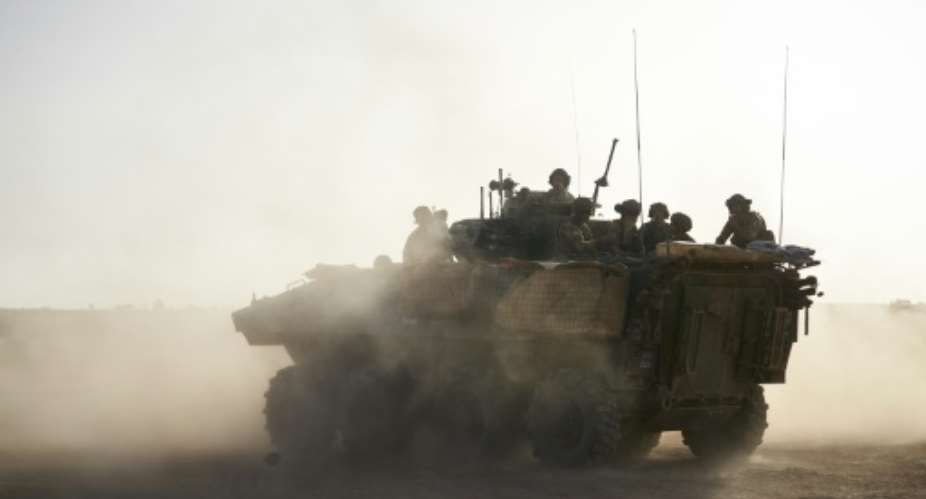Suspected jihadists killed 160 people -- including 20 children -- in the village of Solhan in Burkina Faso's conflict-wracked north on the weekend, in the deadliest attack since Islamist violence reached the West African country in 2015.
Here is what we know so far:
Where?
Northern Burkina Faso, similar to large parts of neighbouring Mali and Niger, is a vast, sparsely populated rural area.
The people in these landlocked regions -- mostly pastoral nomads -- are among the poorest in the world, with little access to education and social services.
With central governments wielding little control over these areas, they have become fertile recruiting ground for jihadist groups, including those affiliated with al-Qaeda and the Islamic State.
The province of Yagha, where Solhan is located, has seen fighting for control between rivals the al-Qaeda-linked Group for the Support of Islam and Muslims (GSIM) and the Islamic State in the Greater Sahara (EIGS).
The area has been almost totally deserted by security forces in recent months.
However, there is a military detachment in the province's main city of Sebba, around 15 kilometres (nine miles) from Solhan, which intervened in the village several hours after the attack in the early hours of Saturday.
Local sources said Sunday they had recovered a total of 160 bodies from three mass graves.
President Roch Marc Christian Kabore declared three days of national mourning and condemned the massacre as "barbaric" and "despicable".
Neither IS nor the GSIM had claimed the attack as of Monday.
Civilians caught in middle
Burkina Faso's army, which is inadequately trained and equipped, is mostly entrenched in camps outside the country's cities. It has been unable to cope with the rising Islamist violence since it crossed the country's border with Mali in 2015.
Aiming to bolster the country's faltering troops in the fight against the jihadists, in 2019 the government formally established local civilian defence groups called the Volunteers for the Defence of the Motherland (VDP).
However -- as has also been the case in Mali where the government has unofficially backed several militia groups -- the increasing activity of the VDP has led to jihadists taking out brutal retribution on civilians.
The assailants struck a VDP position around 2:00 am (0200 GMT) on Saturday, before attacking homes in Solhan and carrying out "executions", a local source said.
Civilians are often caught in the middle of the conflict, being targeted by the VDP or the military over suspicions they support the jihadists, who in turn accuse civilians of siding with the authorities.
International troops, including French from the Barkhane mission and Chadian from the G5 Sahel force, are also deployed in Burkina Faso's north.
The jihadist groups mainly attack state or army targets, often placing homemade bombs in the path of military vehicles.
The jihadists have continued to extend their influence in Burkina Faso since 2015 when they were mostly in the Ansarul Islam group, which is close to al-Qaeda and is based on the Malian border.
The extremely porous borders to Niger and Mali -- particularly in the volatile "three borders" region where Solhan is located -- has further allowed jihadists to spread across the region.
Dialogue?
Burkina Faso, like Niger, has long blamed Mali for the Islamist insurgency. Earlier this year, both countries were still claiming that the jihadists plaguing the Sahel were Malian and carrying out raids over their borders.
But as security forces have failed to staunch the bloodshed, countries in the region have been increasingly considering dialogue with the jihadists.
Last year Kabore opened the door to allowing jihadist fighters to return if they laid down their arms, particularly in the northern Djibo area. A ministry of reconciliation was established earlier this year.
Doubts about the state's ability to respond to the crisis have also affected the relationship between politicians and the military.
"How can one understand that when the country has recorded its deadliest attack in six years, no defence council nor crisis has been convened?" asked political scientist Drissa Traore.
"There is a kind of malaise within the army which does not favour unity, especially in the fight against jihadists."





 'Kill whoever will rig Ejisu by-election' – Independent Candidate supporters inv...
'Kill whoever will rig Ejisu by-election' – Independent Candidate supporters inv...
 Ashanti Region: ‘Apologize to me for claiming I owe electricity bills else... – ...
Ashanti Region: ‘Apologize to me for claiming I owe electricity bills else... – ...
 Ghana is a mess; citizens will stand for their party even if they’re dying — Kof...
Ghana is a mess; citizens will stand for their party even if they’re dying — Kof...
 Internet shutdown an abuse of human rights — CSOs to gov't
Internet shutdown an abuse of human rights — CSOs to gov't
 Free SHS policy: Eating Tom Brown in the morning, afternoon, evening will be a t...
Free SHS policy: Eating Tom Brown in the morning, afternoon, evening will be a t...
 Dumsor: A British energy expert 'lied' Ghanaians, causing us to abandon energy p...
Dumsor: A British energy expert 'lied' Ghanaians, causing us to abandon energy p...
 What a speech! — Imani Africa boss reacts to Prof. Opoku Agyemang’s presentation
What a speech! — Imani Africa boss reacts to Prof. Opoku Agyemang’s presentation
 Dumsor: Tell us the truth — Atik Mohammed to ECG
Dumsor: Tell us the truth — Atik Mohammed to ECG
 Dumsor: Don't rush to demand timetable; the problem may be temporary — Atik Moha...
Dumsor: Don't rush to demand timetable; the problem may be temporary — Atik Moha...
 Space X Starlink’s satellite broadband approved in Ghana — NCA
Space X Starlink’s satellite broadband approved in Ghana — NCA
